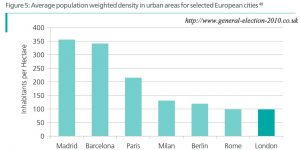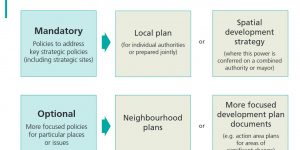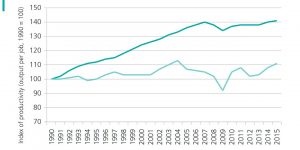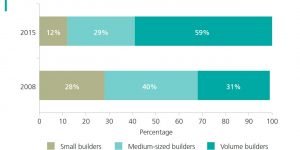Fixing Our Broken Housing Market White Paper
Presented to Parliament by the Secretary of State for Communities and Local Government by Command of Her Majesty
February 2017
Cm 9352
Fixing Our Broken Housing Market White Paper in PDF Format
White Paper Contents
Foreword from the Prime Minister
Foreword from the Secretary of State
Introduction Our Housing Market is Broken
Executive Summary
The proposals in this White Paper set out how the Government intends to boost housing supply and, over the long term, create a more efficient housing market whose outcomes more closely match the needs and aspirations of all households and which supports wider economic prosperity.
The challenge of increasing supply cannot be met by government alone – it is vital to have local leadership and commitment from a wide range of stakeholders, including local authorities, private developers, housing associations, lenders and local communities.
We have listened to concerns expressed by many within the housing and planning sector that the pace of change in policy and legislation can make local delivery more difficult. The White Paper addresses this issue by providing a long-term strategy to build the homes the country needs.
However we also need to help people now to find the right home while our strategy takes effect. So this White Paper sets out how we will address people’s housing needs and aspirations in the shorter term. This includes supporting people to buy or rent their own home, preventing homelessness, improving options for older people and protecting the most vulnerable. Central to making our long term strategy work is the partnership between central and local government and developers. This White Paper sets out the support the Government will provide to enhance the capacity of local authorities and industry to build the new homes this country needs. In return we expect professions and institutions to play their part and turn these proposals into reality:
For local authorities, the Government is offering higher fees and new capacity funding to develop planning departments, simplified plan-making, and more funding for infrastructure. We will make it easier for local authorities to take action against those who do not build out once permissions have been granted. We are interested in the scope for bespoke housing deals to make the most of local innovation. In return, the Government asks local authorities to be as ambitious and innovative as possible to get homes built in their area. All local authorities should develop an up-to-date plan with their communities that meets their housing requirement (or, if that is not possible, to work with neighbouring authorities to ensure it is met), decide applications for development promptly and ensure the homes they have planned for are built out on time. It is crucial that local authorities hold up their end of the bargain. Where they are not making sufficient progress on producing or reviewing their plans, the Government will intervene. And where the number of homes being built is below expectations, the new housing delivery test will ensure that action is taken.
For private developers, the Government is offering a planning framework that is more supportive of higher levels of development, with quicker and more effective processing and determination of planning applications, and is exploring an improved approach to developer contributions. In line with the industrial strategy, we will boost productivity, innovation, sustainability and skills by encouraging modern methods of construction in house building. We will encourage greater diversity of homebuilders, by partnering with smaller and medium-sized builders and contractors in the Accelerated Construction programme, and helping small and medium-sized builders access the loan finance they need. In return, the Government expects developers to build more homes, to engage with communities and promote the benefits of development, to focus on design and quality, and to build homes swiftly where permission is granted. Critically, we also expect them to take responsibility for investing in their research and skills base to create more sustainable career paths and genuinely bring forward thousands of new skilled roles.
For local communities, the Government is offering a simpler and clearer planning process that makes it easier for them to get involved and shape plans for their area. We will ensure they see the benefits of housing growth and have greater say over the design of local developments. In return, the Government asks communities to accept that more housing is needed if future generations are to have the homes they need at a price they can afford.
For housing associations and other not-for-profit developers, the Government has already announced funding worth a total of £7.1 billion through an expanded and more flexible Affordable Homes Programme. We will provide clarity over future rent levels. In return, we expect them to build significantly more affordable homes over the current Parliament.
For lenders, institutional investors and capital market participants, tthe Government is offering a clear and stable long-term framework for investment, including products for rent.
In return we call upon lenders and investors to back developers and social landlords in building more homes.
For utility companies and infrastructure providers, the Government is offering a clear framework and simpler plans to help them understand the demands made on them, and is exploring an improved approach to developer contributions to help pay for new infrastructure. In return, the Government expects infrastructure providers to deliver the infrastructure that new housing needs in good time so that development is not delayed.
At the heart of the White Paper is the acknowledgement that the housing market is very different in different parts of the country. The Government is already putting in place devolution deals and large-scale strategies, such as the Northern Powerhouse, the Midlands Engine and our modern industrial strategy, that bring together public and private sector leaders across different regions.
However, we need a better understanding of the specific local issues that are holding back housing development and economic growth. We need to back mayors and local leaders to deliver in their areas for their communities. We will work with local authorities to understand all the options for increasing the supply of affordable housing.
The policies and proposals set out in this White Paper apply to England only. In Scotland, Wales and Northern Ireland, housing and planning policy is the responsibility of the Scottish Government, Welsh Government and Northern Ireland Executive respectively. The UK Government retains responsibility for housing and planning policy in England, including funding for England-only bodies such as the Homes and Communities Agency (HCA). The Mayor of London is responsible for the functions of the HCA in London.
List of proposals
Step 1: Planning For The Right Homes In The Right Places
Making sure every part of the country has an up-to-date, sufficiently ambitious plan so that local communities decide where development should go;
Simplifying plan-making and making it more transparent, so it’s easier for communities to produce plans and easier for developers to follow them;
Ensuring that plans start from an honest assessment of the need for new homes, and that local authorities work with their neighbours, so that difficult decisions are not ducked;
Clarifying what land is available for new housing, through greater transparency over who owns land and the options held on it;
Making more land available for homes in the right places, by maximising the contribution from brownfield and surplus public land, regenerating estates, releasing more small and medium-sized sites, allowing rural communities to grow and making it easier to build new settlements;
Maintaining existing strong protections for the Green Belt, and clarifying that Green Belt boundaries should be amended only in exceptional circumstances when local authorities can demonstrate that they have fully examined all other reasonable options for meeting their identified housing requirements;
Giving communities a stronger voice in the design of new housing to drive up the quality and character of new development, building on the success of neighbourhood planning; and
Making better use of land for housing by encouraging higher densities, where appropriate, such as in urban locations where there is high housing demand; and by reviewing space standards.
Step 2: Building Homes Faster
Providing greater certainty for authorities that have planned for new homes and reducing the scope for local and neighbourhood plans to be undermined by changing the way that land supply for housing is assessed;
Boosting local authority capacity and capability to deliver, improving the speed and quality with which planning cases are handled, while deterring unnecessary appeals;
Ensuring infrastructure is provided in the right place at the right time by coordinating Government investment and through the targeting of the £2.3bn Housing Infrastructure Fund;
Securing timely connections to utilities so that this does not hold up getting homes built;
Supporting developers to build out more quickly by tackling unnecessary delays caused by planning conditions, facilitating the strategic licensing of protected species and exploring a new approach to how developers contribute to infrastructure;
Taking steps to address skills shortages by growing the construction workforce;
Holding developers to account for the delivery of new homes through better and more transparent data and sharper tools to drive up delivery; and
Holding local authorities to account through a new housing delivery test.
Step 3: Diversifying the Market
Backing small and medium-sized builders to grow, including through the Home Building Fund;
Supporting custom-build homes with greater access to land and finance, giving more people more choice over the design of their home;
Bringing in new contractors through our Accelerated Construction programme that can build homes more quickly than traditional builders;
Encouraging more institutional investors into housing, including for building more homes for private rent, and encouraging family-friendly tenancies;
Supporting housing associations and local authorities to build more homes; and
Boosting productivity and innovation by encouraging modern methods of construction in house building.
Step 4: Helping People Now
Continuing to support people to buy their own home – through Help to Buy and Starter Homes;
Helping households who are priced out of the market to afford a decent home that is right for them through our investment in the Affordable Homes Programme;
Making renting fairer for tenants;
Taking action to promote transparency and fairness for the growing number of leaseholders;
Improving neighbourhoods by continuing to crack down on empty homes, and supporting areas most affected by second homes;
Encouraging the development of housing that meets the needs of our future population;
Helping the most vulnerable who need support with their housing, developing a sustainable and workable approach to funding supported housing in the future; and
Doing more to prevent homelessness by supporting households at risk before they reach crisis point as well as reducing rough sleeping.
Chapter 1: Planning For The Right Homes In The Right Places
Chapter 2: Building Homes Faster
Chapter 3: Diversifying the Market
Conclusion
You don’t have to be an expert in housing or construction to know that our property market is broken. You just have to be one of the millions of hardworking people who can’t afford to buy or even rent the kind of safe, secure, affordable home that previous generations have taken for granted.
It’s all down to the fact that not enough houses are being built. The reasons for this are many and complex but, as this White Paper shows, they can be tackled.
But it’s not something Government can do alone. Local authorities, private developers, housing associations, infrastructure providers, mortgage lenders and local communities all have a role to play. And they’re all supported by measures in this White Paper.
None of this constitutes a blank cheque. Where help and investment is offered we expect to see results. That’s why the White Paper also explains how we will take action against developers or authorities that are not pulling their weight.
As well as the councils and builders and others, this White Paper will help the one group that matters more than any other: hardworking people who just want to be able to afford a place to call their own.
It will help the tenants of today, facing rising rents, unfair fees and insecure tenures. It will help the homeowners of tomorrow, getting more of the right homes built in the right places. And it will help our children and our children’s children by halting decades of declining affordability and fixing our broken housing market for good.
It’s a bold, radical vision for housing in this country. Now we must all work together to turn our blueprint into bricks and mortar.
Annex: Further Detail and Consultation on Proposals
© Crown copyright 2017
This publication is licensed under the terms of the Open Government Licence v3.0 except where otherwise stated. To view this licence, visit nationalarchives.gov.uk/doc/open-government-licence/version/3 or write to the Information Policy Team, The National Archives, Kew, London TW9 4DU, or email: psi@nationalarchives.gsi.gov.ukWhere we have identified any third party copyright information you will need to obtain permission from the copyright holders concerned.
This publication is available at www.gov.uk/government/publications
Any enquiries regarding this publication should be sent to us at publiccorrespondence@cabinetoffice.gov.uk
Print ISBN 9781474137959
Web ISBN 9781474137966
ID SGD0013536 02/17
Printed on paper containing 75% recycled fibre content minimum
Printed in the UK by the Williams Lea Group on behalf of the Controller of Her Majesty’s Stationery Office


















Yes, the housing market is broken.
Would that be anything to do with blessed Margaret Thatcher selling off the council houses?
She sold them off to Tory voters to increase the chances of a Tory election win!
The housing market, which is really the land market, doesn’t work because THERE IS NO (free) MARKET IN LAND.
Every square inch is already owned and they’re not making any more to meet demand.
Land is an asset class like no other but we are bamboozled into believing it is like cars or cheeseburgers or mobile phones or anything else where there IS a functioning free market.
What are you on about ?
Of course no more land is being created, actually climate change means it is being destroyed. This does not mean it is an asset class like no other.
Things like fine art, classic cars, etc., are “investments” because they aren’t making any more Van Goghs or 1960s Ferrari’s. That is an asset class almost exactly like land. Though the painting is rather less functional.
How about more traditional asset classes like, for instance shares. Funnily enough companies don’t issue new shares just for fun. Many companies have a fixed number of shares over many years. These assets rise and fall with the fortunes of the company.
Sometimes the shares are split, which is the same as splitting a piece of land into two. Each half is worth, roughly half what the whole piece was.
You are making a category error. Investment asset classes are characterised by having a fixed, or nearly so, supply. If companies could just issue as many shares as they liked at any time the shares would be worthless. See also, money.
Assets and commodities are completely different things. A commodity, a mobile phone say, has a more or less completely flexible supply. A mobile phone is not an investment asset.
That the land is all owned already does not prevent it being a free market. Anyone who owns land can choose to sell it and anyone who can afford the price can buy it. Just the same as with shares, gold, classic cars or anything else.